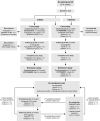Efficacy and Safety of Teduglutide in Infants and Children With Short Bowel Syndrome Dependent on Parenteral Support
- PMID: 37364133
- PMCID: PMC10412081
- DOI: 10.1097/MPG.0000000000003867
Efficacy and Safety of Teduglutide in Infants and Children With Short Bowel Syndrome Dependent on Parenteral Support
Erratum in
-
Erratum.J Pediatr Gastroenterol Nutr. 2024 Sep;79(3):791-794. doi: 10.1002/jpn3.12291. Epub 2024 Jul 2. J Pediatr Gastroenterol Nutr. 2024. PMID: 38956922 No abstract available.
Abstract
Objectives: Our objective was to evaluate the short- and long-term safety and efficacy of teduglutide treatment in infants and children with short bowel syndrome with intestinal failure (SBS-IF).
Methods: Two open-label phase 3 studies and 1 extension study investigated the short- and long-term safety and efficacy of teduglutide (0.05 mg/kg/day) in infants and children with SBS-IF: NCT03571516, 24-week study of infants who were randomized to receive teduglutide or standard of care (SoC); NCT02980666, 24-week study of infants and children who all received teduglutide; and NCT03268811, 24-week extension study of patients who completed NCT02980666 (patients could receive up to 48 weeks of total treatment).
Results: Twelve infants and 8 children enrolled in the core studies, and 2 infants and 7 children in the extension study. After 24 weeks of treatment, parenteral support (PS) requirements reduced by ≥20% from baseline for 4 infants (57.1%) and 4 children (66.7%) receiving teduglutide and for 2 infants receiving SoC (50.0%). One infant (50.0%) and 4 children (80.0%) receiving teduglutide maintained the ≥20% reduction in PS at 48 weeks of treatment. Two children receiving teduglutide achieved enteral autonomy, after 12 weeks and 28 weeks of treatment, respectively. All adverse events (AEs) were in line with known impacts of SBS-IF and adverse reactions to teduglutide. Only one serious AE (abdominal pain) was considered related to teduglutide.
Conclusions: Short- and long-term treatment with teduglutide resulted in clinically meaningful reductions in PS requirements for infants and children with SBS-IF. Teduglutide was well tolerated, and efficacy improved with longer-term treatment.
Copyright © 2023 The Author(s). Published by Wolters Kluwer on behalf of European Society for Pediatric Gastroenterology, Hepatology, and Nutrition and North American Society for Pediatric Gastroenterology, Hepatology, and Nutrition.
Conflict of interest statement
S.C. is an employee of Takeda Pharmaceutical Company Limited, Cambridge, MA, USA and is a stockholder of Takeda Pharmaceutical Company Limited. S.S. is an employee of Takeda Pharmaceutical Company Limited, Osaka, Japan and is a stockholder of Takeda Pharmaceutical Company Limited. E.U. was an employee of Takeda Pharmaceutical Company Limited, Tokyo, Japan. M.W. received research funding from Shire, a Takeda company. The remaining authors report no conflicts of interest.
Figures



References
-
- O’Keefe SJ, Jeppesen PB, Gilroy R, Pertkiewicz M, Allard JP, Messing B. Safety and efficacy of teduglutide after 52 weeks of treatment in patients with short bowel intestinal failure. Clin Gastroenterol Hepatol 2013;11:815–23.e1–3. - PubMed
-
- Jeppesen PB, Pertkiewicz M, Messing B, et al. . Teduglutide reduces need for parenteral support among patients with short bowel syndrome with intestinal failure. Gastroenterology 2012;143:1473–81.e3. - PubMed
-
- Bruzoni M, Sudan DL, Cusick RA, Thompson JS. Comparison of short bowel syndrome acquired early in life and during adolescence. Transplantation 2008;86:63–6. - PubMed
-
- Cole CR, Hansen NI, Higgins RD, Ziegler TR, Stoll BJ; Eunice Kennedy Shriver NICHD Neonatal Research Network. Very low birth weight preterm infants with surgical short bowel syndrome: incidence, morbidity and mortality, and growth outcomes at 18 to 22 months. Pediatrics 2008;122:e573–82. - PMC - PubMed
-
- Duro D, Kamin D, Duggan C. Overview of pediatric short bowel syndrome. J Pediatr Gastroenterol Nutr 2008;47:S33–6. - PubMed
Publication types
MeSH terms
Substances
Associated data
LinkOut - more resources
Full Text Sources
Medical
Miscellaneous

